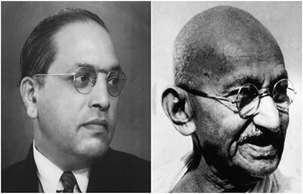

Context
On the occasion on Ambedkar Jayanti 2023, the issue of caste and the ideas of political representation for untouchables becomes the key focus.
|
Ambedkar Jayanti 2023:
|
Historical Background:

- Against the rigid caste structure and raising voice for their rights and representation, B R Ambedkar has made many efforts and he was amongst few people with Gandhi to represent oppressed class issues in political way.
- The fundamental differences between Ambedkar and Gandhi were highlighted the most during the issue of ‘separate electorates’.
- In the early 1930s, the issue of separate electorates for lower castes became a source of major debate.
- So, let us look at the issue of separate electorates which was asked by Dr. Ambedkar and the opposition to it from Gandhi, and how it was eventually ‘rejected in favour of reservations’.
|
What does separate electorate means? Separate Electorates are that type of elections in which minorities select their own representatives separately, as opposed to Joint Electorates where people are selected collectively. |
Ambedkar’s views on caste:
- Unlike Gandhi, who advocated for reforming the caste system by abolishing untouchability, Dr Ambedkar held a more radical view which rejected the institution of caste itself.
- He saw the reformism advocated by contemporary upper caste Hindus as inadequate to undo millennia of discrimination.
- According to him, any revolt against the caste system would only be possible after the oppressed themselves rejected their condition and oppression as being divinely ordained.
- Thus, Ambedkar’s political programme emphasised on lower castes obtaining political power.
- He suggested separate electorates as the form of affirmative action to empower lower castes.
Ambedkar’s arguments for separate electorates:
- He argued during the First round table conference, the depressed classes form a group by themselves which is distinct and separate and, although they are included among the Hindus, they in no sense form an integral part of that community.
- He also highlighted that the Depressed Classes feel that they will get no shred of political power unless the political machinery for the new constitution is of a special make.
How separate electorate can help depressed classes?
- According to Ambedkar’s demands, separate electorates with double vote – one for SCs to vote for an SC candidate and the other for SCs to vote for in the general electorate.
- While he had previously rejected communal electorates (i.e. separate electorates for Hindus and Muslims), his position changed over time, as he realised that while joint electorates might better help integrate lower castes into the Hindu fold, they would do little to challenge their subservient position.
Gandhi’s opposition:
- Gandhi’s opposition to separate electorates was ostensibly based on his view that they “do too little” for lower castes.
- Gandhi argued that rather than being restricted to just this measly share of seats, lower castes should aspire to rule “the kingdom of the whole world”.
- However, the reality of lower castes’ material and social condition was not likely to put them in a position to rule the world.
Gandhi’s Argument:
- British had exploited internal divisions in Indian society for their own purposes.
- Separate electorates, according to him, would only help the British ‘divide and rule’.
- Second, this was also a time when antagonism between Hindus and Muslims was rising.
Evolution of Reservation:
- The reservation system that exists today, in its true sense, was introduced in 1933 when British Prime-Minister Ramsay Macdonald presented the ‘Communal Award’.
- The award made provision for separate electorates for Muslims, Sikhs, Indian Christians, Anglo-Indians, Europeans and the Dalits.
- After long negotiations, Gandhi and Ambedkar signed the ‘Poona Pact’, where it was decided that there would be a single Hindu electorate with certain reservations in it.
|
The Poona Pact:
|


